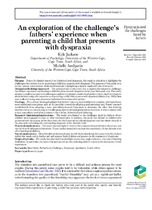| dc.contributor.author | Andipatin, Michelle | |
| dc.contributor.author | Jackson, Kyle | |
| dc.date.accessioned | 2021-09-21T13:34:51Z | |
| dc.date.available | 2021-09-21T13:34:51Z | |
| dc.date.issued | 2021 | |
| dc.identifier.citation | Jackson, Kyle, and Michelle Andipatin. “An Exploration of the Challenge’s Fathers’ Experience When Parenting a Child That Presents with Dyspraxia.” Qualitative Research Journal, vol. ahead-of-print, no. ahead-of-print, 2021, doi:10.1108/QRJ-09-2020-0103. | en_US |
| dc.identifier.issn | 14439883 | |
| dc.identifier.uri | 10.1108/QRJ-09-2020-0103 | |
| dc.identifier.uri | http://hdl.handle.net/10566/6733 | |
| dc.description.abstract | Purpose: Due to the limited research on fatherhood and dyspraxia, this study is critical as it highlights the challenges that fathers face in parenting a child that presents with dyspraxia. The purpose of this study is to inform various interventions while simultaneously highlighting a largely neglected area of research. Design/methodology/approach: The principal aim of this study was to explore the subjective challenges that fathers experience in parenting a child that presents with dyspraxia in the Cape Metropole area. This study adopted a qualitative approach utilising an exploratory design to understand and provide in-depth information about fathers' subjective experiences of parenting a child that presents with dyspraxia (Mack et al., 2005). Data were collected using semi-structured individual interviews with fathers. Findings: The authors’ findings highlight that fathers' roles are inextricably more complex, shifting between more traditional conceptions such as the provider toward the all giving and nurturing care. Future research would benefit from adopting a more masculinity-focused framework to determine the effect that learning disorders have on constructing and challenging more traditional gendered constructions of what it means to be a man, masculinity and what it means to be a father, fatherhood and fathering. Research limitations/implications: The study was limited to the challenges faced by fathers whose children were engaged in some or other treatment plan. In addition, the study was limited to children who presented with dyspraxia, rather than those who had received an official diagnosis and this relates directly to the obscurity and ambiguity surrounding diagnosis of the disorder itself. Practical implications: The study has shed light in terms of the common features between dyspraxia and that of other developmental disorders. This is further extended to include the comorbidity of this disorder with other learning disabilities. Social implications: Mental health professionals may benefit from identifying the issues raised by fathers within this study and to further aid and support both children and parents in the treatment of dyspraxia. Originality/value: The study has shed much needed light on two very neglected areas – the area of learning disabilities, in particular, the issue of dyspraxia and second, including fathers’ voices in the discussion of their experiences. © 2021, Emerald Publishing Limited. | en_US |
| dc.language.iso | en | en_US |
| dc.publisher | Emerald Group Holdings Ltd | en_US |
| dc.subject | Dyspraxia | en_US |
| dc.subject | Fatherhood | en_US |
| dc.subject | Masculinity | en_US |
| dc.subject | Qualitative research | en_US |
| dc.subject | South Africa | en_US |
| dc.subject | Developmental coordination disorder | en_US |
| dc.subject | Apraxias | en_US |
| dc.title | An exploration of the challenge's fathers' experience when parenting a child that presents with dyspraxia | en_US |
| dc.type | Article | en_US |

